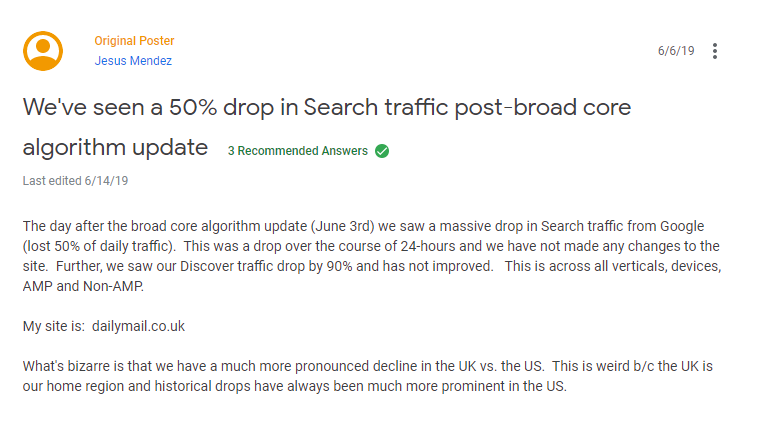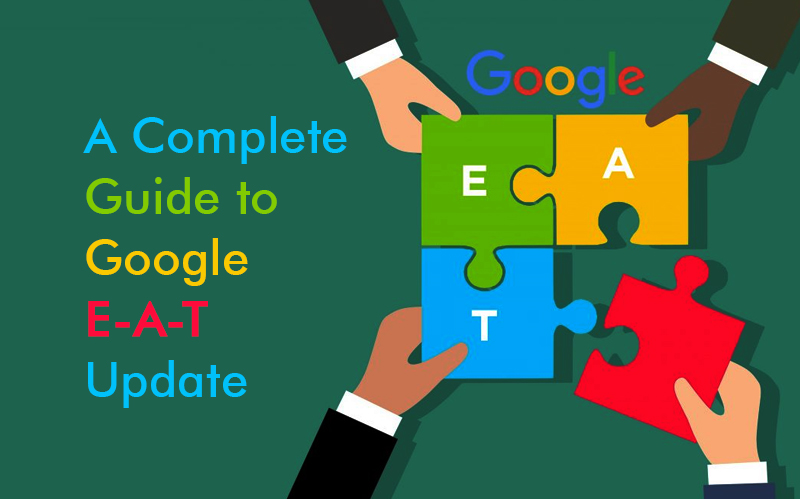Table of Content
What is Google E-A-T?What are the Google E-A-T Guidelines?
Authoritativeness
Trustworthiness
How Google measures E-A-T Algorithm?
How to improve your site’s E-A-T?
Conclusion
Google is always fashionably tight-lipped and mysterious about all of its updates. In 2018, it claimed it makes about 3000+ updates each year. Which means about 57 updates every week and about 8 updates every day!
Google never acknowledges its updates except for the core algorithm updates which it has recently started to preannounce. Many SEO blogs have been for years dedicated to deciphering Google’s guidelines when updating the rankings.
Many ‘leaked’ versions of Google Search Quality Rating Guidelines have made rounds on the internet. But, in November 2015 Google released for the first time a 160 pages long PDF document of its Search Quality Rating Guidelines. This is when the acronym E-A-T came into the limelight.
What is Google E-A-T?
E.A.T is neither a part of a particular update nor is it a ranking factor or metric. It is, in fact, a guideline. The team of Human Evaluators at Google consider E-A-T along with YMYL (Your Money on Your Life) for judging the quality of a page in the Search Results.

The two terms were explained in the Guidelines released by Google in 2015. These guidelines help us reflect on what Google thinks users want. It is a clue to what Google sees when differentiating high-quality content from low-quality content.
Google’s prime concern when delivering results for a searcher’s query is to deliver the most relevant and ‘correct’ results. It does not wish to present its users a website with content that is not reliable. Google is especially concerned about a site’s reliability when it deals with health or finance.
Uneducated advice and fraudulent websites in the said domain can potentially harm a user’s well-being. Google intends to protect its users from such low-quality content. For checking a site for its reliability, Google considers three parameters-
E – Expertise
A – Authoritativeness
T – Trustworthiness
What are the Google E-A-T Guidelines?
The algorithm and ranking updates in Google is a continuous process. Whenever some ask Google how to rank their site well in the SERP. Google’s popular answer to it is ‘Create quality content that your audience wants to read.’ E-A-T further elaborates on Google’s answer as to how to create high-quality content.
There are three parameters to consider:-
Expertise
Google wants its users to consume content that comes from a knowledgeable source. This means the creator of the content on your website should have provable expertise in the area they are writing in. You can be called an ‘Expert’ if you have credentials in the field you are writing in.
According to Google’s guidelines, there are two types of experts-
Formal Experts:
Content creators who are certified professionals have qualifications, work experience, and other accreditation in the subject they are writing on.
This is particularly important if your website talks about medicines, finances, or gives other legal advice.
For instance, if you are writing blogs giving financial advice, you will be considered an expert if you have either a qualification or relevant job experience as finance personnel.
Everyday Experts:
Content creators who have life experience making them an expert in the field they are writing in.
If you are writing reviews for hotels and food, you will be considered an expert if you are a hotelier or an avid restaurant-goer or food lover.
The best way of building your website E-A-T is to have author boxes. The boxes should contain your author’s experience, links to other works, and Social Media Profiles.
Adding to this, you should also make sure that your content creators communicate the knowledge in a way that engages your visitors. The best way to ensure this is to make sure your writer understands what your audience wants. It is essential that your writers not only include keywords in the write-up. He or she should understand the searcher’s intent behind the keywords and address them in the write-up.
The content on your website should be rich in terms of information. It should be comprehensive and suitable for the audience you intend to target. If you are writing let’s say to introduce a topic to your readers then it should be simple and devoid of too many jargon. There should be takeaways for your readers in your content.
Authoritativeness
You can be called an authority if people in your industry look-up to you for your opinion. The reputation of your website and also your content creators are considered by Google. Your authority can be established when-
- Authoritative websites link to your website.
- Your website content is widely shared across social media profiles.
- People are searching for you by your name.
- When you have a Wikipedia page to your name.
- You are mentioned in relevant news articles or websites.
Trustworthiness
While being an expert and authority is essential to rank well. Lack of trustworthiness can easily pull you down. Google does not want to send it searches to sites to get spammed. Hence, Google should be able to trust you to provide true information and honest opinions.
You can establish your trust by having positive reviews on Facebook, Google My Business, Trustpilot, and other similar platforms. Having negative reviews attached to your business or website can heavily impact your site.
Most sites perform well when it comes to Expertise and Authoritativeness. But, get hit when it comes to trustworthiness. Something similar happened to Daily Mail after June 2019 Core Update.

Daily Mail had been receiving bad reviews. Wikipedia in 2017 voted to ban the site. The site has a one-star rating on Trustpilot. The publication can hire writers who are experts and have authority. But, still, the publication lost about 50% of its search traffic during the Core Update.
Hence, you must have no negative sentiments surrounding your brand for Google to consider you as a trusted source.
Here are a few ways in which you can foster trust for your site:-
- Have Contact Us and About Us pages that help your visitors connect to you easily.
- Have a secured website domain. Implement HTTPS correctly to ensure your visitors’ data entered by them will never be intercepted by a third entity.
- If your site has transactions make sure you have clear refund policies.
- You should have a Terms & Conditions Page accessible to all your users.
- If your site is selling products then make sure you have important information about your products and safety advice if any.
- If your site shares knowledge then having an author bio can help.
How Google measures E-A-T Algorithm?
This would be a tricky question to answer as no one from outside Google can have a proper answer to this. Google Medic Update in August 2018 is often considered to be Google’s first attempt to determine which site has a good E.A.T. However, my guess is Google had been considering E-A-T way before it but had acknowledged it when it published it’s Quality Rating Guidelines.
The medic update was said to be global, implying every niche and type of site. However, the data after the roll-out showed the sites that were majorly hit by the update were from the Medical and Health niche.
Another Broad Core Algorithm Update in March 2019 affected ‘Your Money on Your Life’ kinds of sites. Both of these updates and their effects clearly show its important to pay attention to Quality Raters Guidelines.
Quality raters guidelines are a textbook guide to how Human Quality raters in Google assess a site. From the guidelines, it can be inferred that the measure of E-A-T has a lot to do with links. Google knows which links and mentions can be considered a definite vote for trustworthiness and authority.
How to improve your site’s E-A-T?
The Quality Guidelines are in itself clues as to how you can improve your site’s E.A.T.
Good Reviews
It matters to Google what real users and experts think about you. Google’s Quality Guidelines mentioned to look-up reviews on Yelp, Amazon, BBB, to decide on the trustworthiness of a site. Google suggests quality raters to look for articles, reviews, and forum posts on good sites for reputation research.
All sites have some bad reviews. This won’t affect you much. However, make sure that you do not have a popular negative sentiment surrounding your business. Subsequently, positive reviews can help you rank well.
Get a Wikipedia Page or mentions on Wikipedia Page
Getting a Wikipedia page is not that easy. You would have to meet its notability standards. Though, links from Wikipedia are nofollow, mentions on such an authoritative page can really help.
Mentions on good and authoritative sites and forums
If you get links or mentions through guest posting or paid links would help you a little. If however, authoritative sites like publications or recognized blogs are recommending you or your content writer this can add a lot to your authority.
Good authority mentions can be a little hard to get. But some ways in which you can get authoritative mentions include:-
- Publish well researched and original content.
- Build connections with journalists and authoritative people in your field.
- Summarize research content in your relevant field in layman’s language and inculcate it in your content.
Include author boxes with name and biographies
It helps your readers and Google know who is responsible for the content they are reading. It is also an important factor while assessing the E-A-T of a website. Especially for YMYL websites.
If you have an E-Commerce website then customer support contact information should be present on your pages. For your blog posts, your author information must be present to let Google and readers evaluate whether they are an expert on the topic.
Focus on Personal Branding and Technical Security
Reviews are an important factor for accessing the E-A-T of a website. Having a positive reputation is vital for a good E-A-T score. The best way of building a good reputation is by building a good social media profile. Develop your authority by being placed on a trusted platform.
Technical security is as important as a positive reputation. If your checkout page has an insecure connection it would result in a ‘Low’ rating. Chrome has marked all HTTP pages ‘Not Secure’. So, any site without the SSL certificate would have to worry about its E-A-T score.
Make sure your pages are secure. Assure your visitors that the information that they are providing you with is secured.
Conclusion
E-A-T is Google’s attempt to stop fake news, biased and misleading, and low-quality content. Google in July 2018 revised its Quality Raters Guidelines. One of the most noticeable changes in the guidelines was for content creators. Google wants its human raters to not only evaluate the reputation of the websites but also of the content creators.
The updated guidelines ask the raters to rate the sites low when the title of the page is sensational or doesn’t match the content of the page.
Another major focus of the updated guidelines is on the ‘purpose’ for which websites are created. If the website is created solely to rank on Google with keyword-stuffed content might receive a low E-A-T score.
The latest updates to the guidelines and Google’s Core Algorithm Updates, all suggest that E-A-T plays an important role in ranking.


